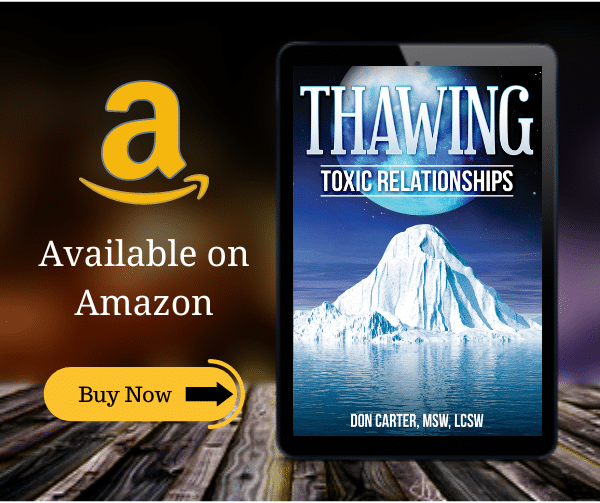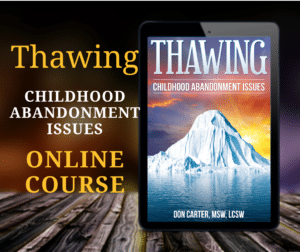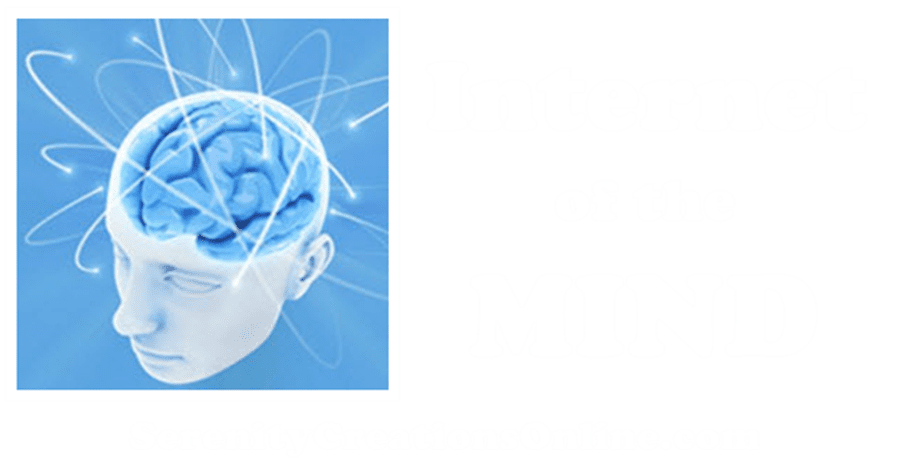
Overcoming Addiction, The Iceberg Part Four
Reaching Out for Help
Reaching out for help with such things as overcoming addiction and depression is a neural network that we are not born with. If we grew up with a significant amount of woundedness… we are likely to be better at acting-out than we are at reaching-out because it was either not taught or not allowed. Furthermore, the infection of shame makes it very difficult to ask for help. So we try overcoming addiction on our own… But nothing works – we feel even more demoralized.
Often, it is only when the pain becomes unbearable that we begin to even consider reaching out… we call this “hitting bottom”. Adding the accumulated shame of childhood with having to admit an inability in overcoming addictions to alcohol, drugs, sex, food, or gambling – to name a few – gives us an idea of the magnitude of the problem one can have with asking for help.
Can you hear the voice of shame? “See – now you are really proving what a loser you are!” Even when the pain is great enough to bring someone in for counseling… they are often compelled to manage the impression of the counselor to the extent that it can actually sabotage the assessment process. Here the person who has “reached out” by making the counseling appointment answers many of the questions in a way that suggests they are fine and there really is no problem.
Sometimes it takes a few sessions before they begin to feel safe enough with the helper, the environment, and the confidentiality to open up. It depends on what Stage of Change they are in when they arrive for their session… Internalizers are more likely to reach out early than Externalizers because the latter frequently has an excessive need to be right.
Externalizers are “shameless and blameless” because their defenses are geared toward making everyone else responsible for their problems…To admit a problem of any kind requires taking an inward look. This is highly irregular for an Externalizer because their shamelessness is an overcompensation for the actual shame and pain they would feel if they were able to “see” the truth.
So, usually, the pain of hitting bottom must outweigh the pain of facing their inner world before they are motivated to reach out. On the other hand, the defenses of Internalizers are geared toward self-contempt – They are “not important, never right about anything, total failures, and unworthy of happiness.”
This makes overcoming addiction, codependency, chronic depression and anxiety seem impossible. People who reach out later than sooner are usually so full of shame that when they do take that initial inward look they say things like… “Man, I don’t even have any values anymore!”
In addition to the toxic infection of shame…there is the normal guilt and remorse they feel for the bad things they have done during the course of their addiction. The food addict is full of shame over repeated failures to control their eating…The sex addict is full of shame over the inability to honor their marriage by staying faithful… The gambling addict is full of shame over the inability to take care of his family due to overwhelming debt…The work-a-holic is full of shame over hundreds of broken promises to spend time with his wife and kids.
Recovery – A Hard Sell
Imagine you are reaching out for help with something as difficult as overcoming addiction because you are in the most emotional pain you have ever felt in your life. Now imagine hearing the helper say that you need to give up the only comfort and relief you’ve ever known and face this pain without it.
That’s what it is like for someone who finds themselves at the bottom… It is a very hard sell even when the person knows you are right. It helps if they know that overcoming addiction and codependency involves more than just learning how to live without their addiction. It helps to know that the ultimate goal is the recovery of the True-Self… In Maslow’s words – Self-Actualization.
Who Am I, Really?
Self-Actualization is about achieving – or “actualizing” – your full potential. Overcoming addiction, chronic depression and anxiety require that we resume the pursuit of this growth need.
We all seem to have some basic, instinctual questions of existence programmed into us at birth. I see it as a neural network pre-programmed with compelling questions that we are driven to answer…”Who am I?”… “What am I doing here?”…”What’s my purpose?”…”How do I fit into the circle of life?” (Yeah, I borrowed that one from the Lion King).
Addiction… depression… abandonment, shame, and contempt…are examples of chronic neural nets are very limiting and hold us back from the pursuit of answers to those compelling questions. At some point, these deeply embedded networks begin to provide false answers — enter the False-Self. The False-Self is just that – false, It’s not a self at all – its a neural network of emotional woundedness posing as a self… Being “false” means it is not true – It’s NOT who I am.
We have also seen that our Invented-Self in not who we are either – it’s a role we learned to play in order to survive… a set of thoughts, beliefs, and actions that are stored on a neural net of my own creation to cover up who I mistakenly think I am.
If the False-Self poses as my private self… the Invented-Self as my public self… but both are impostors or counterfeits – then who am I really? For anyone who has ever struggled with overcoming addiction, codependency, or major depression… this is the million dollar question!
Discovering Your True-Self
If you believe either in a power greater than yourself or in the innocence of a child… I believe I can prove that the False-Self is not who you are. For those of you who believe neither in God, nor the inherent goodness of man, I may not be able to provide sufficient proof of this… overcoming addiction and depression will be more difficult as a result. If this is true of you, I challenge you to look within and see if it might be contempt and woundedness that is getting in your way. I believe in you and wish you all the wonderful things that life has to offer.
If you do believe there is a Divine Creator… do you think He would want a small child to feel defective at his/her very core? Would a loving God want them to go through their entire childhood feeling that they are no good… That everything bad that happens is their fault? Of course not – that’s an easy one…This is proof for believers that the False-Self is NOT what God created. No, this woundedness is what world created – Healing it is a necessary part of overcoming addiction.
The True Self is what God created… and it’s been part of us since before we were born. Then life happened, the woundedness grew and covered up the True-Self… pushing it far beneath the surface of our awareness before we even had a chance to get to know ourselves.
The True-Self was replaced with an impostor – the False-Self… As a child, we bought into it and learned to live outside ourselves – abandoning our inner world. Then we poured a slab of concrete over it and put on a mask locking it all in place and effectively alienating ourselves from who we were created to be – Our True-Self (See diagram below)
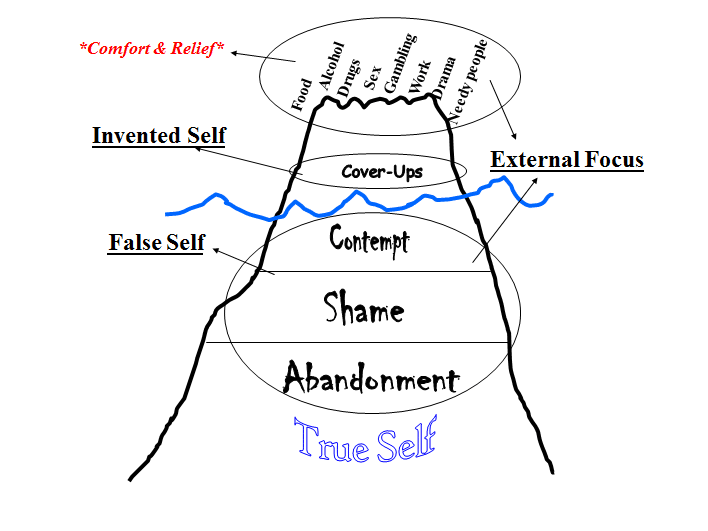
I believe the True-Self is who God created and that this is where our spirit resides… I also believe this is why God can feel especially far away to some of us. Our spirit is what connects with his Spirit. If we don’t have access to our spirit we feel cut-off from God.
Our True-Self is also where our purpose resides…overcoming addiction requires that we find quality of life in order to maintain our motivation… Why not pursue these questions of existence now?
In his book, A Purpose Driven Life, Rick Warren points out that our purpose is not really our purpose at all… it’s His purpose for us. We were created with a special set of talents and abilities in order to perform His purpose for us.
In my case, I know this to be true because I was at a very dark place in my life at 29 years old – addictions, chronic depression, thoughts of suicide… I reached out and got help overcoming addiction and depression… less than a year later I was back in college studying to be a counselor.
This presentation I call the Iceberg is a map of the things I’ve learned personally and professionally. My journey of recovery has helped me answer those compelling questions about my purpose and who I am… I hope you are on – or can now begin – the same journey and find your own answers as a result.
In the Bible, it says that “He who overcomes himself is greater than he who overcomes a city”… Do you wonder which “self” we are to overcome? In another place, Jesus says, “Woe to the Pharisees, for they clean the outside of the cup and leave the inside dirty”… Is that not what we do when we wear a mask and abandon our inner life?
Even if you are agnostic – or atheist for that matter – I think most can believe in the innocence of a child.
We all come into this world innocent and pure. That innocent, pure True-Self gets wounded and covered up by a False-Self regardless of your religious or spiritual beliefs. A “Higher Power” maybe a group of people who have something you want and are willing to show you how they got it… or the feelings you get from being in nature… or anything that is greater than you.
Recovering Your True-Self
Overcoming addiction, codependency, chronic depression, adult-child syndrome, and other conditions that come from abandonment issues requires a recovery process… The process of recovery has a beginning, middle, and late-stage.
The beginning is the hardest part of any change process – it’s no different with overcoming addiction and depression related to being an adult/child of a dysfunctional family. The first thing that needs to happen has already been mentioned – the person needs to hit bottom and reach out for help with overcoming addiction and depression.
Transition & Stabilization
The first sign to a counselor that recovery is underway is that the client consistently shows up for their sessions… even then we’ve only just begun the process. When people feel enough pain to come in for help many times their denial is still largely intact. I learned early on in my career that everyone who comes through my door for counseling has the same general problem – they are in pain… and they all want the same general thing – comfort and relief. (See diagram below)
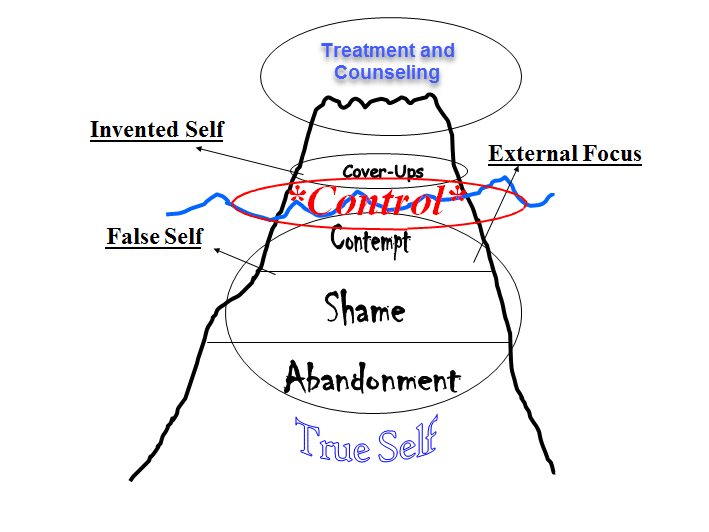
But just because they are in pain… and they want comfort and relief…that does not necessarily mean they want to know what’s bothering them! They may say… “I am here to get help with my depression”… The Therapist might ask… “Why are you depressed?”… Client: “I don’t know”…
Therapist: “Well, do you drink?”… Client: “Yes, but that’s not my concern right now”… Therapist: “How much and how often do you drink?”… Client: “Probably too much, I have had three DUIs, but that’s not why I am here. I’m here because I am depressed”…
Therapist: “If that is not the problem then do you have any theories about what is?”… Client: “You’re the therapist, you tell me!” This person’s mental filters are still set-up to protect his ability to drink alcohol. The client wants comfort and relief but still subconsciously fight that painful inward look at the reality that alcohol is not good for them…
For more about subconscious resistance see When Chronic Stress is a Steady-State
They are already in pain. – To let go of their denial too soon might be overwhelming. Care must be taken to go forward at an acceptable pace, building coping skills and supports first. For an example of how to establish and develop these new skills & supports for overcoming addiction – see my video entitled Zebras and Giraffes.
Early Stage Recovery
Early recovery involves internalizing the new skills and supports that were established in the transition and stabilization stage…(See diagram below)
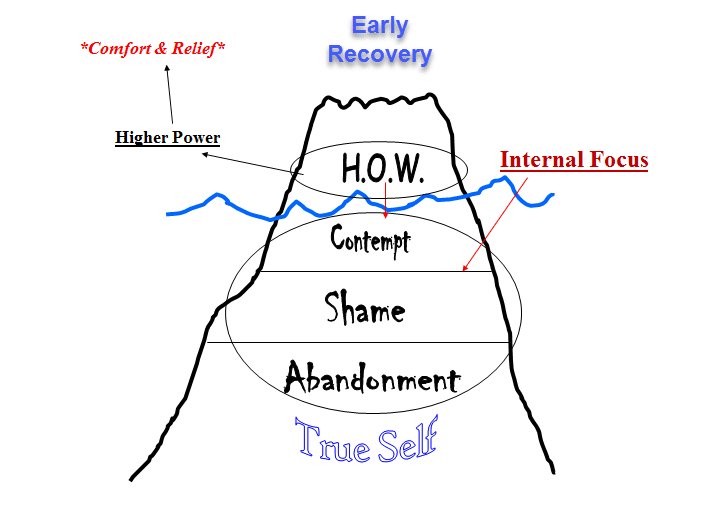
The person is drawing comfort and relief from a recovery program that includes spirituality and an inward focus… they have gotten Honest-Open-Willing (H.O.W.) to make appropriate and necessary lifestyle changes.
They are putting all the pieces in place to begin healing the original pain of abandonment, shame, and contempt – (The False-Self)
Middle Stage Recovery
In the middle stages of recovery, the person now has a well established neural network of recovery… They also have developed external support networks of other recovering people. He or she is using an internal focus and applying specific recovery skills designed to give the proper treatment to the emotional wound within… (See diagram below)
The True-Self is beginning to emerge… it’s an exciting time of personal and spiritual growth! I like John Bradshaw’s Seven S’s of recovery for the general outline of specific recovery activities:
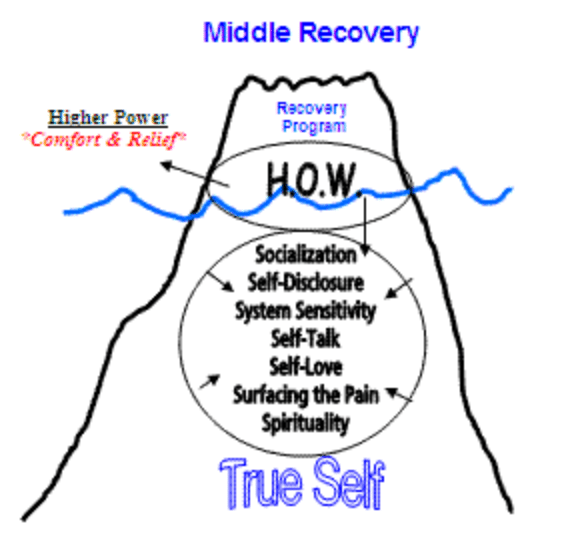
- Socialize – Attend non-shaming recovery, therapy or church groups
- Self-Disclosure – Come out of hiding, break the no-talk rule
- System Sensitivity – Understand the family system you came from
- Self-Talk – Positive affirmations, silence the inner critic
- Self-Love – Take care of yourself, do the hard work of recovery
- Surfacing the Pain – Talk about it, understand it, get it out
- Spirituality – Prayer and Meditation
Late Stage Recovery
In late recovery, the True-Self has come to the Surface! You continue a process of recovery and growth. Spiritual healing and your relationship with God – as you understand God – has reached a new level. You continue discovering more and more about your purpose in life…connecting with skills and abilities you never knew you had. (See diagram below)
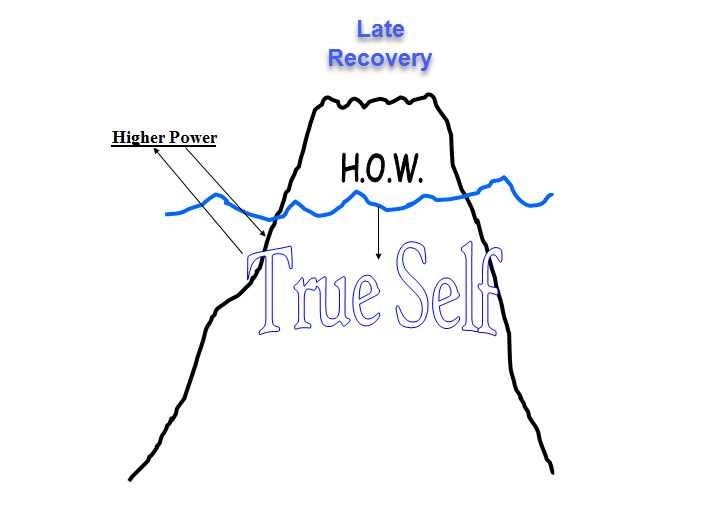
By overcoming an addiction you are self-actualizing


